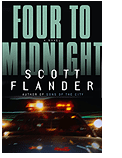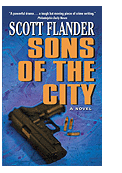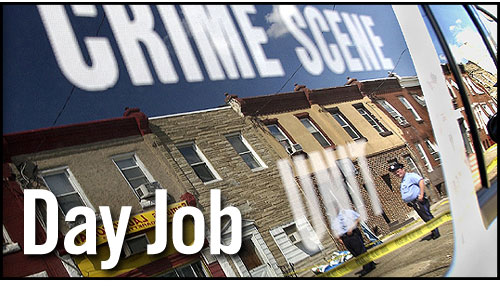  
|
|
 THE LONE RANGER
LIKE A PHANTOM, Will Gress glides in silence through the North Philly night on his mountain bike, along the dark, empty streets, past the crackhouses and the trash-filled lots, past the crackhead hookers standing in the shadows, past the abandoned factories, the bars, the drug corners, past as much sadness as one neighborhood can hold. On one corner, in front of a bar, a man with a baseball cap calls out, "Powder!" Meaning, powdered cocaine. Gress wheels his bike toward the man, calling back, "How much?" The man is about to answer, but then sees Gress' yellow jacket, his gunbelt, his bike helmet with the words, "Philadelphia Police." "Baby powder!" the man says, trying hard to smile. "Baby powder." Gress laughs. The man laughs. "You're good," the man says, now with a big, toothy grin. "You got me. I'm going to put this one in my memory banks." Gress, as the only bike cop in the 25th Police District, patrols alone, night after night, in some of the city's most dangerous, drug-ridden neighborhoods. And he loves it. He knows he's more vulnerable than a cop in a car. But he also knows that, because of his stealth, he can often be more effective. The dealers and the other denizens of the street corners almost never see him coming. When many people think of Philly bike cops, they picture the yellow-jacketed officers cruising through the city's nicer neighborhoods, particularly downtown. That's probably because the department's first bike patrols, eight years ago, were in Center City, and they were the subject of numerous newspaper and television stories. And it was also in Center City that the bike cops, during the 2000 Republican National Convention, were a highly visible symbol of police presence that helped keep the protests peaceful. But there are now bike patrols in every police district in the city, in every kind of neighborhood, said Lt. William Schmid, who's in charge of training bike officers. Some of the department's 130 bike cops are even assigned to the Narcotics Strike Force, and work with undercover officers to make busts. The 25th District, which covers a swath of eastern North Philadelphia, once had 10 bike officers. But during the past year, Capt. Thomas Nestel transferred eight, who he said needed a change of pace, to other duties. One of the two remaining recently moved on to another assignment, leaving Gress as the district's lone bike cop. Nestel said he plans to move other officers into bike patrol as soon as training becomes available. For now, though, Gress is on his own. He couldn't be happier. Responding to mayhem Gress zips back and forth across the district—often faster than the traffic-bound patrol cars—responding to shootings, stabbings, and other mayhem. He comes to the aid of cops in foot pursuits through darkened alleys, and helps keep the sidewalks clear of drug dealers and dice-shooters and prostitutes. He even chases down cars. Last year, when a drunken driver sideswiped a fellow bike officer, Gress pursued the car for seven or eight blocks until it stopped at a traffic light. Gress rode up alongside, pulled out his gun, and put the man under arrest. Gress acknowledges that being a bike officer in what cops call a combat district has its risks. "Someone could take a shot at me any time," he said. "You have to assume that everybody has a potential for carrying." But, he adds, he likes the challenge of the 25th. "There's so much more activity going on." He's even got a large tattoo on his back that says, "Welcome to the Badlands"—using the nickname cops have given the area. Gress, 26, joined the bike patrol two years ago not because he was into bicycling—he wasn't—but because he considered himself pretty athletic and thought it would be interesting. He hasn't been disappointed. Though he said the hardest part of being a bike cop in the 25th is just getting taken seriously. He's had corner drug dealers laugh at him and make siren sounds. "They ask you, 'Where's your patrol car?' It's funny to them. They just don't consider you a police officer." Sometimes when people call 911 for help, they're disappointed when Gress shows up on his mountain bike. "They'll say, 'I want a real cop. I want a cop in a car.' " Philly's bike cops are clearly identified as police on their jackets, on their helmets, and on their bikes. But Gress has even had a problem on Germantown Avenue, where he watches over merchants as they close up their shops for the night. Some jewelry store owners there were so worried about getting robbed, "they wouldn't let me in because they didn't believe I was a police officer," he said. Cops in patrol cars usually have trouble getting close enough to drug dealers. The dealers' lookouts spot the police, even when they're in unmarked cars, a block or more away, and shout warnings like "Bajando!" - "Coming down!" But Gress can be on top of criminals before they realize it. He was recently cruising near 13th and Venango streets, and saw a large group of young men in front of a porch. He knew what it was—an illegal dice game that's regularly at that spot, and has such high stakes that it has given rise to shootings and other violence in the neighborhood. Gress popped up on the curb and flew down the sidewalk, and in a flash he was upon them, catching a dice-shooter in mid-roll. He didn't arrest anybody—that's a difficult and dangerous task for a cop on his own—but he broke up the game, at least for a while. Sometimes, he directs officers in cars to illegal activity, other times, his goal is simply to keep the dealers and dice shooters from doing any business. This is greatly appreciated by hard-working, law-abiding residents who have the misfortune of living near a problem corner. Neighborhood guy Lillian Cruz was sitting on her steps with her niece the other night when Gress came down her block. Gress and Cruz talk from time time; once, when his bike light went out, Cruz helped fix it. "Everyone around here respects him," she said. Then she nodded toward a nearby corner and added, "It just got quieter when he came down here. It's like he's a soldier where the enemy is." Gress said he gets a lot of satisfaction when he sees an area where crime is going down and life starts to return to normal. "You see kids coming outside to play, and people coming out from behind their barred porches to clean," he said, adding, "Not everything is negative down here. There are some positives." Gress, who grew up in Tacony, isn't Latino, though he has a Puerto Rican flag as well as an American flag on the back of his bike. That's partly because his fiancee Gloria and their two children—and a third on the way—are Latino. "I have the flag out of pride," he said. It's also good public relations in a district that's largely Latino. Some people see the flag and think he's Puerto Rican, and then speak to him in Spanish. That can get confusing, because although Gress said he understands the language, he doesn't speak it well. Still, he enjoys working in an area as diverse as North Philly. "I couldn't be in a place where there's only one culture," he said. Gress, who has been a cop for more than five years, gets high marks from his captain. Bike officers, said Nestel, need to be arrest-oriented. "You have to get officers in the mindset and Will Gress is in that mindset," said Nestel. Although bike cops have often been used for community relations, said Nestel, "the best kind of community relations is locking up bad guys." Gress said he hopes his brother, Brian—who's also a police officer in the 25th—can become a bike cop as well. "He would be the perfect partner," Gress said. "If you could have a partner, who better than your brother?" Several of his fellow officers say they worry sometimes about Gress riding alone at night. But Gress doesn't mind. "The neighborhood doesn't intimidate me," he said. "I realize how dangerous it is, but you can't worry. You have backup out there, and you have to use common sense. Whatever is going to happen, is going to happen. You can't hide from a neighborhood you're hired to protect." Read the next story, THEY'RE THE DOMINO'S PIZZA OF DRUGS. Home | Books | About Scott | Links |